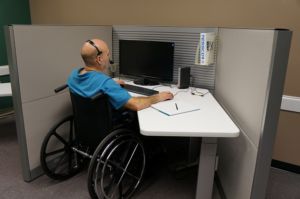 Under the ADA, an employer must offer a qualified person with a disability a “reasonable accommodation” that will provide an equal employment opportunity, including an opportunity to attain the same level of performance, benefits, and privileges available to similarly situated employees who are not disabled. Reasonable accommodations may include “job restructuring, part-time or modified work schedules, reassignment to a vacant position, acquisition or modification of equipment or devices, appropriate adjustment or modifications of examinations, training materials or policies, the provision of qualified readers or interpreters, and other similar accommodations for individuals with disabilities.” 42 U.S.C. § 12111(9).
Under the ADA, an employer must offer a qualified person with a disability a “reasonable accommodation” that will provide an equal employment opportunity, including an opportunity to attain the same level of performance, benefits, and privileges available to similarly situated employees who are not disabled. Reasonable accommodations may include “job restructuring, part-time or modified work schedules, reassignment to a vacant position, acquisition or modification of equipment or devices, appropriate adjustment or modifications of examinations, training materials or policies, the provision of qualified readers or interpreters, and other similar accommodations for individuals with disabilities.” 42 U.S.C. § 12111(9).
In most instances, an accommodation request must come from the employee. It is not the employer’s responsibility to suggest an accommodation if, for instance, your boss suspects you suffer from depression. Indeed, the employer could face liability if it suggested that you have a disability when, in fact, you do not. This is why it is vitally important that you tell human resources if you have a disability.
Once the employee requests an accommodation, the ADA requires that employer engage in a good faith effort to find a reasonable accommodation that will allow you to perform the essential functions of your job. This process should not be a one-time event; instead, it should be an interactive process where the employee and employer work together to find a solution.
Reasonable Request and Undue Hardship
If you’re protected under the ADA, once you make a request, the employer must make the accommodation unless the request is unreasonable or constitutes an “undue hardship.” As with most things dealing with the ADA, there is no one-size-fits-all answer for any of these questions. Instead, courts conduct what lawyer call a “fact-specific” inquiry: that is, the court will look at all the variables and decide whether the ADA requires the requested accommodation.
Let’s start with the first prong, reasonableness. Most requests will be considered reasonable if they will help the employee perform the essential functions of the job. I think we can all agree that a request for a quiet office space is reasonable if you are an accountant whose job it is to churn out financial reports. An example of an unreasonable request is a disabled employee who sued his employer because the employer refused to lower the sink in the kitchen so that the employee could reach it to pour out his cold coffee. (This is a true story.) The employee could still pour out his coffee but had to go to the bathroom to do so.
It would have cost the employer a mere $150 to lower the sink, which was not an undue hardship under any analysis. But the court ruled that it was not a violation of the ADA—not because lowering the sink represented a hardship but because the requested change had little relationship to the essential functions of the employee’s job. Thus, it was not a reasonable request for an accommodation. So, game over.
The technical definition of undue hardship is when an accommodation would result in “significant difficulty or expense incurred by a covered entity.” You can read the full, mind numbing regulation that defines undue hardship with five factors here: 29 C.F.R. § 1630.2(p).
Most of the factors boil down to common sense.
For example:
How much would the accommodation cost the employer?
How well is the employer able to absorb this cost?
What kind of impact would the accommodation have on the employer and other employees?
Clearly, what might constitute an undue hardship for a mom-and-pop operation with 16 employees might not be a burden for Google.





